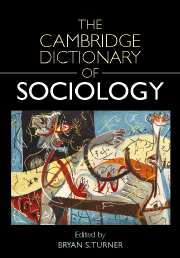Introduction
Published online by Cambridge University Press: 22 October 2021
Summary
At one level, sociology is easy to define. It is the study of social institutions – the family, religion, sport, community, and so on. We can study institutions at the micro-level by looking at interactions between family members, for example, or we can examine macro-relations such as the family and kinship system of a society as a whole. Below this level of minimal agreement, there is considerable dispute as to what sociology really is, and during the twentieth century and into this century many critics of sociology have periodically pronounced it to be in crisis or to be moribund. It is said to be prone to jargon, or it is claimed by its critics to be merely common sense. A natural scientist at my former Cambridge college, on hearing that I was editing a dictionary of sociology, inquired in all seriousness whether there would be enough concepts and terms for a whole dictionary. My problem as editor has by contrast been the question of what to leave out. In this context of lay skepticism, a dictionary of sociology is in part a defense of the discipline from its detractors, and in part a statement of its achievements and prospects. It aims to give a precise, informative, and objective account of the discipline, including both its successes and failures, and in this sense dictionaries are inherently conservative. A dictionary seeks to give an informed guide to a particular field such that both the expert and the student can benefit intellectually.
In many respects, part of the problem for sociology as an academic discipline lies in its very success. An outsider to the academy at the end of the nineteenth century, sociology is now influential in archaeology, the arts, the history and philosophy of science, science and technology studies, religious studies, organizational theory, and in the teaching of general practice and community medicine in medical faculties, where the social dimension of everyday reality is now taken for granted. The study of contemporary epidemics in public health, especially the AIDS/HIV epidemic, has employed sociological insights into networks and risk taking. The management of any future pandemicwill drawupon sociological research on social networks, compliance behavior, and the impact of such factors as social class, gender, and age on prevalence rates. Other areas such as art history and aesthetics often draw implicitly on sociological notions of audiences, art careers, art markets, and cultural capital.
- Type
- Chapter
- Information
- The Cambridge Dictionary of Sociology , pp. xi - xviiiPublisher: Cambridge University PressPrint publication year: 2006



